|
|
|
Sort Order |
|
|
|
Items / Page
|
|
|
|
|
|
|
| Srl | Item |
| 1 |
ID:
175705
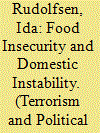

|
|
|
|
|
| Summary/Abstract |
Research on the relationship between food insecurity and unrest has a long history. The food price spikes in 2007–2008 and 2010–2011 coincided with demonstrations and incidents of large-scale violence, prompting renewed scholarly interest in the link between food insecurity and unrest. This paper reviews the literature, synthesises its main empirical findings and central explanations, and identifies four particular issues to consider to enhance our understanding of how food insecurity is related to unrest. First, there is a wide range of suggested theoretical mechanisms of how food insecurity is linked to unrest, but the empirical tests are akin. Second, there exist various notions of the independent variable, but there is a gap between the theoretical definition and measurement. Third, the focus is often on “food riots”, but whether rioting is the most likely response, and whether it is possible to separate between “food-related” unrest and other types of turmoil is unclear. Lastly, there is a challenge to address the endogenous nature of food insecurity and unrest. The paper adds to the literature by pointing to the theoretical mechanisms linking food insecurity to unrest, relating both to the type and degree of food insecurity, and how we understand and define unrest.
|
|
|
|
|
|
|
|
|
|
|
|
|
|
|
|
| 2 |
ID:
182689
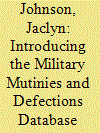

|
|
|
|
|
| Summary/Abstract |
Military mutinies are critical to scholars’ collective understanding of civil–military relations. This article introduces a new dataset that systematically codes mutinies across all regions and conducts an exploratory analysis of these new data. The primary contribution made here is the introduction of a new dataset that provides scholars with a sample of mutinies across region, space, and time. The new Military Mutinies and Defections Database (MMDD) codes events of military indiscipline from 1945 to 2017. This dataset uses geocoding techniques that will enable scholars to explore the spatial patterns and diffusion associated with mutinies. The second contribution is the preliminary exploration of these new data. Of note, I demonstrate that over one-third of all mutinies are violent, 6% of mutinies are associated with civilian deaths, and anocracies are more likely to experience mutinies than democratic or autocratic counterparts. MMDD provides investigators with an exciting new tool to explore dimensions of military disloyalty.
|
|
|
|
|
|
|
|
|
|
|
|
|
|
|
|
| 3 |
ID:
100581
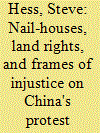

|
|
|
|
|
| Publication |
2010.
|
| Summary/Abstract |
This article highlights the way in which Chinese protestors resisting home eviction and demolition have begun to develop innovative, media-savvy tactics for winning public sympathy for their causes and framing their plights as unjust, and considers the political implications of this trend.
|
|
|
|
|
|
|
|
|
|
|
|
|
|
|
|
| 4 |
ID:
082405
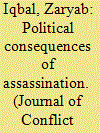

|
|
|
|
|
| Publication |
2008.
|
| Summary/Abstract |
The assassination of a political leader is among the highest-profile acts of political violence, and conventional wisdom holds that such events often have substantial political, social, and economic effects on states. We investigate the extent to which the assassination of a head of state affects political stability through an analysis of all assassinations of heads of state between 1952 and 1997. We examine the political consequences of assassination by assessing the levels of political unrest, instability, and civil war in states that experience the assassination of their head of state. Our findings support the existence of an interactive relationship among assassination, leadership succession, and political turmoil: in particular, we find that assassinations' effects on political instability are greatest in systems in which the process of leadership succession is informal and unregulated
|
|
|
|
|
|
|
|
|
|
|
|
|
|
|
|
| 5 |
ID:
190886
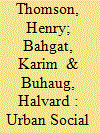

|
|
|
|
|
| Summary/Abstract |
The world’s population is increasingly concentrated in cities. Research on urbanization’s implications for peace and security has been hampered by a lack of comparable data on political mobilization and violence at the city level across space and through time, however. Urban Social Disorder 3.0 is a detailed event dataset covering 186 national capitals and major urban centers from 1960 to 2014. It includes 12 types of nonviolent and violent events, detailing the actors involved and their targets, start and end dates of each event, and the number of participants and deaths. We provide an overview of the main features of these data, and trends in urban social disorder across space and time. We demonstrate the utility of the dataset by analyzing the relationship between city size and the frequency of lethal disorder events. We find a positive relationship between city population and lethal urban social disorder, unlike previous studies. These new data raise promising avenues for future research on democratization; climate change and food security; and spillovers between different forms of mobilization and violence.
|
|
|
|
|
|
|
|
|
|
|
|
|
|
|
|
|
|
|
|
|